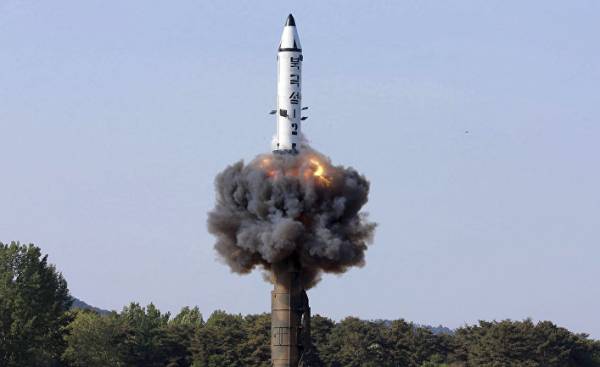
Seoul — North Korea poses a number of nuclear warheads and developing ballistic missiles capable of delivering them around the world. Many countries are already thinking about how to prevent or slow down further progress of the DPRK, and what to do if Pyongyang does not manage to contain. Obviously, these are important questions, but they — not the only one. It is also important to understand how North Korea creates a number of nuclear warheads and developing ballistic missiles capable of delivering them around the world. Many countries are already thinking about how to prevent or slow down further progress of the DPRK, and what to do if Pyongyang does not manage to contain.
Obviously, these are important questions, but they — not the only one. It is also important to understand how North Korea managed to successfully develop nuclear and missile programs, despite decades of efforts of the international community. Probably too late to try to influence the trajectory of North Korea, but it’s not too late to learn from experience. On — ten lessons, which we ignore.
1. The government, which has fundamental scientific know-how and modern manufacturing capacity and intentionally developing rudimentary nuclear weapons, sooner or later will succeed.
2. Assistance may be limited, but it is. There will always be those who benefits from it — no wonder there’s a black market. Some countries may promote such markets, despite the commitment not to do so.
3. The economic sanctions there is a limit. Although sanctions can increase the cost of production of nuclear weapons, history shows that the authorities are ready to pay dearly if they need it. In addition, there are indications that some, if not all sanctions can be lifted as soon as the authorities of other countries take as a given the nuclear status of the country and decide to focus on other issues. It happened with India.
4. Governments are not always willing to put the global problem (in this case, resistance to the proliferation of nuclear weapons) above that they consider the immediate strategic interests. China opposes the proliferation, but not as zealously as he wants to keep the divided Korean Peninsula or to provide a stable buffer zone on its border in North Korea. This weakens any economic pressure that China will have on the country over its nuclear program. The US opposed the development by Pakistan of nuclear weapons, but hesitated because they needed the support of Pakistan in the struggle against the USSR in Afghanistan.
5. After 75 years after the first use and 25 years after the end of the cold war, nuclear weapons are still considered valuable. This is based on security reasons and not prestige.
Once Israel has considered it in the face of threats of annihilation of the Jewish state by the Arabs. Later, the Ukraine, Libya and Iraq abandoned nuclear programs, either voluntarily or under pressure. Subsequently, the part of Ukraine was invaded by Russia, Iraq, the United States, and Libya — the U.S. and its European partners. Saddam Hussein in Iraq and Muammar Gaddafi in Libya were overthrown.
North Korea has avoided a similar fate, and now there ruled with an iron hand the third generation of KIMS.
6. The non-proliferation Treaty — the agreement in 1970, which is the basis of international efforts to prevent the spread of nuclear weapons beyond the five countries (USA, Russia, China, Britain and France) recognized nuclear States for a limited, but indefinite, inadequate. It is a voluntary agreement. Countries are not obliged to sign it, and can withdraw it without penalty if you change your mind. The inspection is intended to confirm compliance with the Treaty, are based on information provided by host governments, which, as we know, do not open just.
7. Diplomatic efforts like the recent ban on all nuclear weapons organized by the UN, will have a serious effect. Such pacts are the modern equivalent of the Covenant, the Briand-Kellogg 1928, banning war.
8. In the international system is a serious gap. There is a clear norm against the proliferation of nuclear weapons, but there is no consensus or agreement about what should be done if the country is developing or buying nuclear weapons.
9. Alternatives to combat the proliferation of nuclear weapons not develop. In the early 1990-ies, the United States considered the option of using military force to halt the North Korean program in the Bud, but it was rejected out of fear to provoke a new Korean war. This is true today, although now it will require a lot more effort, and not the fact that they will be successful.
10. Finally, not every problem can be solved. Some can only be managed. For example, it is too early to believe that Iran one day will return to its nuclear program. The agreement of 2015 has delayed this risk but not eliminated it. It only remains to decide what to do about North Korea. Managing these issues can get a bad result, but often it’s the best you can hope for.







